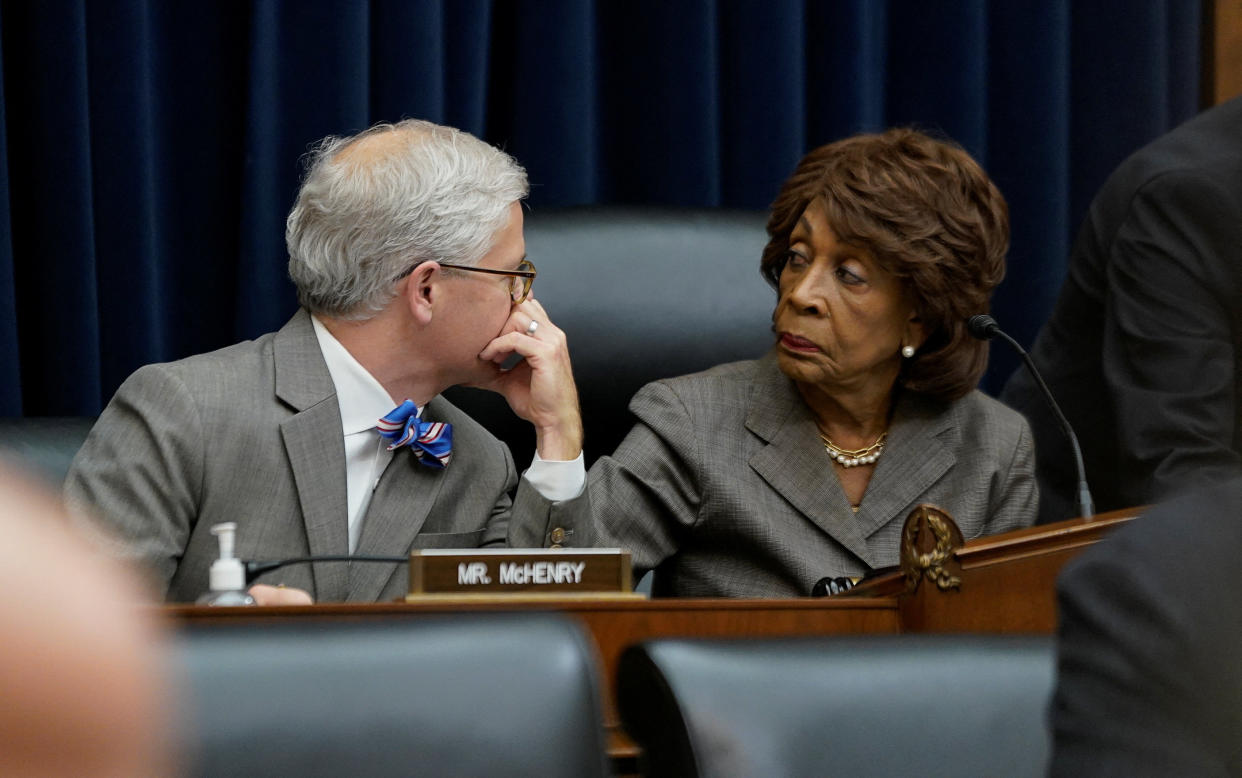Rep. Waters floats changes to the House stablecoin bill. Will Republicans cooperate?
Rep. Maxine Waters (D-Calif.), the top Democrat on the House Financial Services Committee, is proposing several changes to stablecoin legislation put forth last fall, according to a person familiar with the matter.
Waters is circulating a draft of changes to the bill to gauge whether other committee members would support the adjustments. This comes after Waters suggested during a hearing last month that the stablecoin bill negotiated last fall was no longer valid — and that lawmakers may need to start from scratch.
Meanwhile, without the input of Democrats, Republicans on the House Financial Services Committee crafted their own draft of a stablecoin bill — including giving strong authority to the states to continue regulating stablecoin issuers. Waters said financial services committee chair Patrick McHenry (R-N.C.) "alarmed" her when he told her Republicans came up with their own new bill.
Stablecoins are a cryptocurrency linked to a currency like the US dollar, or short-term securities, as a way to mitigate the volatility of digital coins and maintain a stable value. They’re mostly used to trade in and out of cryptocurrencies, but are increasingly used for traditional banking products like savings accounts. However, there’s little regulatory oversight or FDIC backing. Regulators are worried stablecoins could be vulnerable to runs—similar to the financial crisis of 2008 when investors rushed to redeem their stakes, forcing fire sales of the fund shares.
The fear: if stablecoins become a larger part of the payment system that could pose larger risks to the financial system. For example, stablecoin from Circle — the largest stablecoin issuer in the US — temporarily broke its peg to the US dollar when Silicon Valley Bank failed.

Waters' proposed changes are "proof positive that Democrats and Republicans aren't that far apart on this issue despite the rhetoric," said John Rizzo, Senior VP Public Affairs for the Clyde Group and former Treasury spokesman in the Biden administration. "The text of her draft bill makes clear that there's a deal to be had underneath all the recriminations...It's more of a question of political will than substance."
The California congresswoman, who was previously chair of the full committee and led negotiations with Republicans on stablecoin legislation last year, said the original bill didn't account for issues tied to crypto exchange FTX's failure — and other matters in bills Democrats and Republicans conjured up last year. The committee is now led by McHenry.
Waters offers three major changes from last fall's proposed legislation aimed at addressing concerns raised by lawmakers, the US Treasury and the Federal Reserve — and at the same time maintaining most of the remaining compromises agreed to with McHenry.
Those include: strengthening protection for digital wallets when it comes to separating customer assets from crypto exchanges – so-called commingling — a central issue surrounding the collapse of FTX. This would be accomplished by ensuring that all assets of a customer are segregated from the assets of the wallet provider.
Another change would strike direct access to the Fed for non-bank stablecoin issuers. Some lawmakers raised concerns about giving non-banks access to the Fed’s lending without having to comply with the same requirements banks have.
The third would give the Fed the option to decline any registration of a state approved stablecoin issuer — a redline for the Fed. The change would align bank and non-bank stablecoin issuers with the process already in place for state-chartered banks, which are also separately approved at the federal level before being able to operate.
These changes proposed by Waters were first reported by Politico.
Last year, Democrats and Republicans worked on a stablecoin regulatory framework before the midterm elections. That draft would have allowed non-banks to issue stablecoins — and require stablecoin issuers to maintain reserves backing their stablecoins on an at least one-to-one basis. Those reserves could include US dollars, Treasury bills and central bank reserve deposits.
Republicans have vowed to work with Democrats on stablecoin legislation. McHenry's office did not immediately respond for comment.
Click here for the latest stock market news and in-depth analysis, including events that move stocks
Read the latest financial and business news from Yahoo Finance
